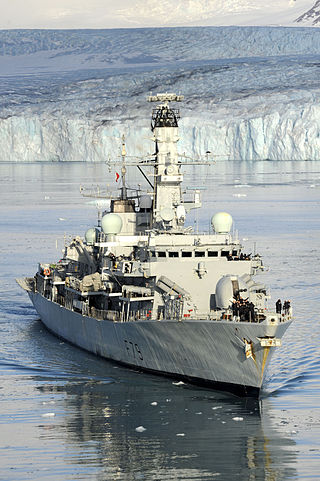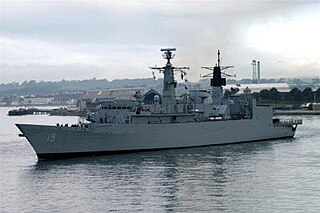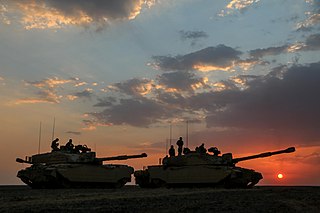
The Type 23 frigate or Duke class is a class of frigates built for the United Kingdom's Royal Navy. The ships are named after British Dukes, thus leading to the class being commonly known as the Duke class. The first Type 23, HMS Norfolk, was commissioned in 1989, and the sixteenth, HMS St Albans was commissioned in June 2002. They form the core of the Royal Navy's destroyer and frigate fleet and serve alongside the Type 45 destroyers. They were designed for anti-submarine warfare, but have been used for a range of uses. Ten Type 23 frigates remain in service with the Royal Navy, with three vessels having been sold to the Chilean Navy, one being retired in 2021, and two being retired in 2023.

HMS Norfolk was a British Type 23 frigate, the sixth in the Royal Navy to use this name, laid down in 1985 by Yarrow Shipbuilders. She was launched on the Clyde by Princess Margaret, Countess of Snowdon in July 1987 and named for the Dukedom of Norfolk. She was commissioned on 1 June 1990. Norfolk was the 'first of class', as well as being the first of a new generation of 'lean manned' ships. She was commissioned into the Chilean Navy in 2006 as Almirante Cochrane.

HMS Montrose was the eighth of the sixteen-ship Type 23 or Duke class of frigates, of the Royal Navy, named after the Duke of Montrose. She was laid down in November 1989 by Yarrow Shipbuilders on the Clyde, and was launched on 31 July 1992 by Edith Rifkind, wife of Malcolm Rifkind, Secretary of State for Defence. She was commissioned into service in June 1994.

The third and current HMS Argyll is a Type 23 Duke-class frigate. She is currently the oldest serving Type 23 frigate in the Royal Navy. Like all of her class she is named after a British dukedom, in this case that of Argyll. HMS Argyll was laid down in March 1987 by Yarrow Shipbuilders at Glasgow, and launched in 1989 by Lady Wendy Levene, sponsored by the Worshipful Company of Paviors. She was commissioned in May 1991. Argyll is currently based at HMNB Devonport.

HMS Lancaster is a Duke-class Type 23 frigate of the Royal Navy, launched by Queen Elizabeth II on 24 May 1990. The ship is known as "The Queen's Frigate", the Duke of Lancaster being a subsidiary title of the Sovereign. Being the third ship in the Type 23 class, Lancaster was originally allocated the pennant number F232 until it was noted that the 232 is the Royal Navy report form for groundings and collisions and therefore considered unlucky. She is one of the few ships left in the fleet with some female officers but mess decks which are men-only. It is quite common when she has returned from long operations that she is flown over by the Avro Lancaster bomber which is part of the Battle of Britain Memorial Flight based at RAF Coningsby.

HMS Monmouth was the sixth "Duke"-class Type 23 frigate of the Royal Navy. She was the seventh ship to bear the name and was launched by Lady Eaton in 1991, being commissioned two years later.

HMS Grafton is a Type 23 frigate formerly in service with the Royal Navy. She was the ninth vessel to bear the name, and is named after the Duke of Grafton. Ordered in January 1992, Grafton was laid down on 13 May 1993 by Yarrow Shipbuilders. The frigate was launched on 5 November 1994 and commissioned into the Royal Navy on 29 May 1997 with the pennant number F80. In 2007 the ship was transferred to Chile as Almirante Lynch and, having undergone a significant upgrade from 2019 to 2020, remains in service with the Chilean Navy.

HMS Portland is a Type 23 frigate of the British Royal Navy. She is the eighth ship to bear the name and is the fifteenth and penultimate ship of the 'Duke' class of frigates, and is named for the currently extinct title of the Dukedom of Portland, and more particularly for the third Duke, who was Prime Minister.

HMS Brazen was a Type 22 frigate of the Royal Navy. She was completed three months ahead of schedule due to the Falklands War.

Almirante Williams is a Type 22 frigate in service with the Chilean Navy. It entered service with the British Royal Navy in 1988 with the name HMS Sheffield, and served with the Royal Navy until 2002. Initially it was meant to be called Bruiser, but was named Sheffield in honour of the previous Sheffield, a Type 42 destroyer sunk in the Falklands War. In 2003, the vessel was acquired by the Chilean Navy and renamed Almirante Williams.

RFA Fort George was a combined fleet stores ship and tanker of the Royal Fleet Auxiliary, and one of two Fort Victoria-class replenishment oilers.
This article describes the composition and actions of the Argentine naval forces in the Falklands War. For a list of naval forces from the United Kingdom, see British naval forces in the Falklands War.

Six warships of the Royal Navy have been named HMS Marlborough after the Duke of Marlborough:

Standing Royal Navy deployments is a list of operations and commitments undertaken by the United Kingdom's Royal Navy on a worldwide basis. The following list details these commitments and deployments sorted by region and in alphabetical order. Routine deployments made by the Navy's nuclear-powered submarines and their location of operations is classified.

RFA Wave Knight is a Wave-class fast fleet tanker of the Royal Fleet Auxiliary (RFA) of the United Kingdom tasked with providing fuel, food, fresh water, ammunition and other supplies to Royal Navy vessels around the world.

The Condell class was the name given to a class of two new build and upgraded type Leander-class frigates of the Chilean Navy, Almirante Condell and Almirante Lynch.
Several ships of the Chilean Navy have been named Almirante Condell after Admiral Carlos Condell (1846–1912), hero of the Battle of Punta Gruesa during the War of the Pacific:
In 1989 the Royal Navy was under the direction of the Navy Department in the UK Ministry of Defence. It had two main commands, CINCFLEET and Naval Home Command.

Exercise Saif Sareea is a series of military exercises undertaken by the United Kingdom and Oman which first began in 1986 and most recently took place in 2018.




















